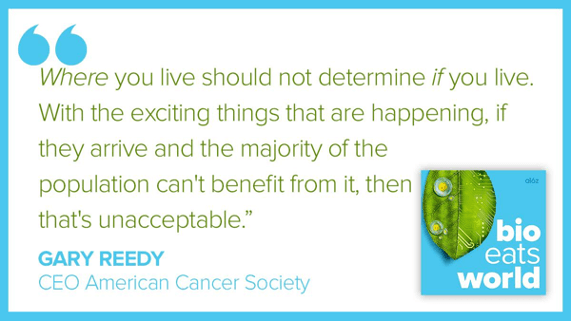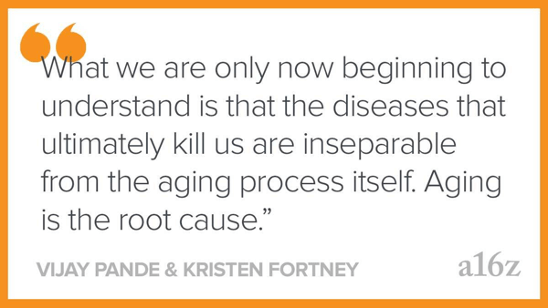This post first appeared as an issue of the a16z Bio Newsletter. Subscribe to stay on top of the latest trends in bio and healthcare.
IN THIS EDITION:
- Are we ready for the cure for cancer?
- Understanding aging might be the key to Alzheimer’s
- A Nobel Prize for CRISPR
- Going back to the workplace, in a pandemic
- Join the Bio Eats World Journal Club
The cure for cancer might finally be coming -- and we aren't ready...
The science of treating cancer has never been more promising — as Gary Reedy (President of the American Cancer Association), Jonathan Lim (CEO and co-founder of Erasca), and Jorge Conde (a16z general partner) discussed with host Hanne Winarsky in this episode of our new podcast, Bio Eats World.
But even if we could cure all cancer tomorrow — say with engineered cell therapies like CAR T — our system could not yet handle actually getting the treatments to the patients who need it most. These medicines are both the most complex and the most impactful we’ve ever seen; you can’t pick them up in a pill bottle at your corner pharmacy. In this call to action, Jorge Conde describes the infrastructure we need to build today, and the issues we need to think through, in order to make sure we get these life-saving medicines to all patients, at scale, as soon as possible.
Read the full article on the challenges of delivering cell and gene therapies at scale »
...While a new treatment for Alzheimer's might come from understanding aging
The discovery that deleting one gene in a tiny worm — suddenly increasing that worm’s lifespan — dramatically transformed the science of aging from a fringe field into a promising path to one day (hopefully) helping us all live longer, and healthier, lives. But understanding aging also has the potential to give us the best map of the promising drug targets for some of the most challenging age-related diseases, like Alzheimer’s. In this article, a16z general partner Vijay Pande and CEO and co-founder of BioAge Kristen Fortney, suggest that our best route towards breakthroughs for these diseases is in treating the biggest risk factor: aging. And in this related episode of the Bio Eats World podcast, Longevity Fund Founder Laura Deming joins Fortney and Pande to discuss with host Hanne Winarsky where we are in the science of aging, and where it might lead us.
Read more about how slowing aging slows age-related diseases »
A Nobel Prize for CRISPR
Earlier this month, Jennifer Doudna and Emmanuelle Charpentier were awarded the Nobel Prize in Chemistry for their discovery and development of the CRISPR/Cas9 method for genome editing. On our news show, 16 Minutes, Vijay Pande and Jorge Conde talk to host Sonal Chokshi about this momentous occasion and what it means for the field. While CRISPR is often described as “genetic scissors” (i.e. a tool), the real promise of CRISPR is its application as a gene-editing platform. As Jorge Conde describes in the episode, CRISPR is a swiss-army knife, and we have only just accessed the scissors — but there is so much more it can do.
Going back to the workplace, in a pandemic:
In the Before Times, for the vast majority of us, talking to your employer about your health was limited to understanding your benefits package. COVID-19 has changed this entirely, as employers now have to wrestle with whether to bring employees back, monitoring employee health, and preventing disease transmission. No one’s been preparing all their life to be a Chief Covid Officer — so how do employers make these critical decisions? What tools do they need? In this Bio Eats World episode, a16z general partner Vineeta Agarwala, Phong Nguyen (EVP and General Manager at Accolade), Ryan Sandler (CEO and co-founder of Truework), and Mark Sendak (Population Health & Data Science Lead at the Duke Institute for Health Innovation) discuss how employers can think about this — a framework of prevent, triage, trust (and then test, trace, isolate); tools to incorporate and manage data from tests, surveys, and temperature checks; the tech we have, and where we need human expertise to help; privacy and trust around this sensitive health data; and much more.
Join the Bio Eats World Journal Club
Every Thursday on our new podcast Bio Eats World, host Lauren Richardson dives deep into a new scientific article with experts, discussing the key implications of the breakthrough research and how to translate these new insights from paper to practice. So far, we’ve covered:
- Degrading drugs for problem proteins with Carolyn Bertozzi (Stanford)
- Modeling mysterious brain structures with Madeline Lancaster (MRC LMB)
- Turning a toxin into a genome editing tool with Jorge Conde and a16z deal team partner Andy Tran
- Super-scaling COVID-19 testing with DNA sequencing with Sri Kosuri (Octant) and Valerie Arboleda (UCLA)
- and most recently, reversing Parkinson’s with new neurons with Xiang-Dong Fu (UCSD).
We want to hear from you. What have we missed? What is coming next? Email us at bioeatsworld@a16z.com



